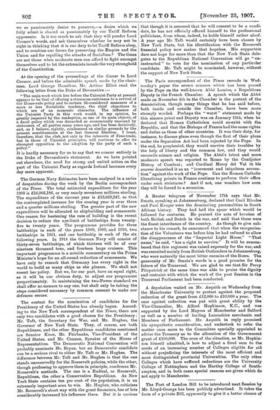The contest for the nomination of candidates for the Presidency
of the United States has already begun. Accord- ing to the New York correspondent of the Times, there are only two candidates with a good chance for the Presidency : Mr. Taft, the Secretary for War, and Mr. Hughes, the Governor of New York State. They, of course, are both Republicans, and the other Republican candidates mentioned are Senator Knox, Mr. Fairbanks, Vice-President of the Viiited States, and Mr. Cannon, Speaker of the House of Representatives. The Democratic National Convention will probably nominate Mr. Bryan, but no Democratic candidate can be a serious rival to either Mr. Taft or Mr. Hughes. The difference between Mr. Taft and Mr. Hughes is that the one stands unreservedly for the Roosevelt policies, while the other, though professing to approve them in principle, condemns Mr. Roosevelt's methods. The one is a Radical, or Roosevelt, Republican, the other a Conservative Republican. As New York State contains ten per cent. of the population, it is an extremely important area to win. Mr. Hughes, who criticises Mr. Rooseveles,short way with the great financiers, has of late considerably increased his influence there. But it is curious
that though it is assumed that he will consent to be a candi- date, he has not officially offered himself to the professional politicians, from whom, indeed, he holds himself rather aloof. A year ago Mr. Taft would certainly have been chosen by New York State, but his identification with the Roosevelt financial policy now makes that hopeless. His supporters dare not hope for more than that the New York State dele- gates to the Republican National Convention will go " un- instructed " to vote for the nomination of any particular candidate. Mr. Taft might be nominated, however, .without the support of New York State.


















































 Previous page
Previous page